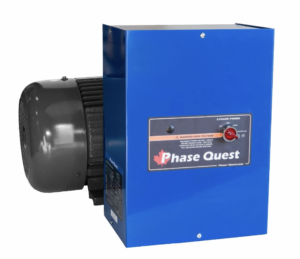How a Rotary Phase Converter Works
A rotary phase converter (RPC) is an electromechanical device that converts single-phase electrical power into three-phase power, which is often required for industrial machinery. Here's how it works:
- Input Power: Single-phase power is supplied to the rotary phase converter.
- Idler Motor: The heart of the converter is an idler motor (also called a "rotating transformer"). This motor generates a rotating magnetic field.
- Generation of Third Phase: The idler motor produces a third voltage (phase) by utilizing the rotating magnetic field. The converter uses capacitors to balance the voltage and phase angles of all three phases.
- Output Power: The output from the converter is a simulated three-phase power, which can be used to run three-phase equipment.
The output power is not a perfect three-phase supply like that from the grid, but it is usually sufficient to run many types of three-phase machinery efficiently.

 Be Canadian, buy Canadian.
Be Canadian, buy Canadian.